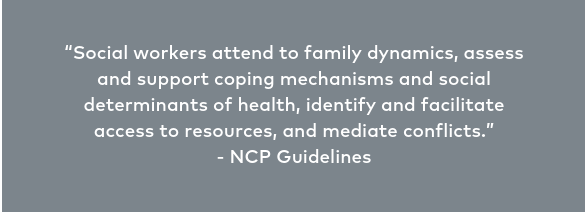The Social Worker’s Role in Community Palliative Care: Insights from the Field
Many argue that the role of the palliative care social worker is particularly critical in community settings, where improving quality of life for patients depends on care coordination and navigating patient/family/provider dynamics. Yet community palliative care programs report challenges in defining and integrating the role of social workers.

We explored this issue in a focus group with more than a dozen palliative care social workers representing health systems, hospitals, nursing homes, group practices, pediatric programs, health plans, institutes, and coalitions from all corners of the country. Through facilitated discussion, the focus group identified challenges, highlighted promising practices, and defined ways that CAPC and SWHPN can aid in strengthening social worker involvement in community palliative care.
We learned that there are two main obstacles that compromise the social worker’s role in community palliative care:
1) Role Confusion
Social workers around the table were united in their belief that their role on the palliative care team is misunderstood and undervalued. They cited the need for clearer definition of the role—both as a national concept, and in practice on individual teams–and of differences between social work generalists and those who provide specialty palliative care. The discussion highlighted confusion and even competition that can exist between palliative care social workers and those representing other specialties (such as oncology or care management), when roles and boundaries are unclear.
Social workers were united in their belief that their role on the palliative care team is misunderstood and undervalued.
Participants expressed a need for metrics that demonstrate the financial and non-financial benefits of social work to community palliative care programs, and suggested that their role will remain confusing and devalued in the absence of viable ways to measure their effectiveness and outcomes.
"Administrators love data! Without data that measures the work we do, we are ‘invisible’ members of the team, especially because social workers provide non-billable services."
2) Lack of reimbursement
In a fee-for-service payment model, most social work services lack reimbursement. Focus group participants said that “value” is ascribed to those members of the palliative care team who generate income, and not to them—even though the care coordination, symptom management, and staff support that social workers provide contribute to patient outcomes and reduce the total costs of care. Lack of reimbursement leads to the perception that social workers as “lesser” members of the team, and makes it more difficult for program leaders to justify this non-revenue-generating discipline in their staff mix.
Lack of reimbursement leads to the perception that social workers as “lesser” members of the team.
Strategies to Meet the Challenges
Focus group participants didn’t just highlight obstacles—they brought ideas and promising practices to the table! Here are their insights on trends that clarify the role, and strengthen the impact of community palliative care social workers:
Seek training and certification opportunities
Schools of social work increasingly include content on palliative care in their curricula, and offer internships that expose social workers to palliative care practices. For those already in the workforce, there are a growing number of mid-career training opportunities, fellowships, and certificate programs with concentrations in palliative care. In addition to building clinical skills, these educational offerings help define the role of social work in community palliative care programs, and emphasize leadership competencies that advance the status of social workers in the field. Focus group participants had first-hand experience with the following programs, which are two examples of many:
- New York University Silver School of Social Work Certificate Palliative Program, which provides integrated courses that unite theory and practice, expand assessment and intervention skills using a biopsychosocial-spiritual framework, and emphasize leadership skills.
- California State University Institute on Palliative Care’s Post-MSW Palliative Care Certificate Program, an eight-month online program that offers a certificate of completion, with topics including the role of the palliative care social worker, functioning as an interdisciplinary team member, skill development, ethics, and social work leadership.
For those wishing to become palliative care certified, SWHPN is launching a test-based social work palliative care certification that measures competency rather than time served in a social work position. The first exam for the Advanced Palliative Hospice Social Worker Certification (APHSW-C) will be held in winter 2019, with a second testing window in July. To prepare social workers for the test, SWHPN recorded seven webinars, each covering a main topic area of the examination. This webinar information will also be presented at an in-person pre-conference session at the SWHPN General Assembly, March 17-19, 2019 in Orlando, Florida.
"We didn’t have content on palliative care and serious illness care during our social work training. But now it’s in the curriculum! Those of us in the field also have more opportunities for additional training but the challenge is carving out the time. We are stretched very thin."
Familiarize yourself with standards that define social work involvement
The National Coalition for Hospice and Palliative Care recently released the National Consensus Project’s Clinical Practice Guidelines for Palliative Care, 4th Edition (NCP Guidelines), which formalize evidence-based practices for providing reliably high-quality palliative care in all care settings. The new guidelines define the role of the social worker as part of the palliative care interdisciplinary team and offer practice examples on addressing the psychosocial and spiritual needs of patients that can be used as a roadmap for community palliative care.

The new guidelines define the role of the social worker as part of the palliative care interdisciplinary team.
Several focus group participants mentioned using The Joint Commission’s program accreditation standards (the Community-Based Palliative Care Certification Option for Home Health & Hospice) as guidelines, even if their program was not pursuing certification, suggesting that the standards provide a framework for community palliative care policy development and team composition.
“Help Wanted”: An Ask from Social Workers
How can professional organizations such as CAPC and SWHPN help to reduce barriers and strengthen the social work component of community palliative care? Focus group participants crafted some clear marching orders:
- A virtual gathering spot: Develop and broadly advertise a special interest group and/or a place to post questions and receive answers from fellow palliative care social workers.
- A place at the table: Foster more visible inclusion of social workers in presentations, webinars, and training modules—with increased emphasis on real-world social work practice examples.
- Cultivate social work leadership: Design mechanisms to promote leadership skill development and increase the number of social workers in leadership roles, including supervisory and management positions.
- Advocate for reimbursement: Initiate and support efforts to expand billable services performed by social workers. Support alternative payment models that enhance opportunities for social workers to bring their unique skills to community palliative care programs and patients.
- Demonstrate value: Help programs understand how to use both quantitative and qualitative data to demonstrate the value of social work in community palliative care.
Community-based palliative care social workers are integral to supporting the psychosocial needs facing patients and their families, while providing critical help to other members of the palliative care team. Developing strong leaders, heightening our visibility across the palliative care field, and highlighting data that shows our impact will lead to better outcomes for patients and families.
Available resources
In the meantime, we have gathered the below existing resources (from SWHPN and CAPC), which we think you will find useful. We’ll keep you updated as new resources become available, especially those which address the needs discussed during the focus group.
SWHPN Resources
For all SWHPN resources, visit this link.
CAPC Resources
- Virtual Office Hours: The Role of the Social Worker on the Interdisciplinary Team: Small-group conversation and Q&A led by Phil Higgins, PhD, LICSW. Monday, March 18th. Register now.
- Master Clinician Series: A virtual case presentation delivered by an interdisciplinary group of Master Clinician faculty, followed by an interactive discussion about the challenging aspects of the case. Occurs monthly. Register now.
- CAPC Clinical Training Curriculum: Online, interactive courses in communication, symptom management, caregiver support, and other key skills (continuing education credits for social workers provided by NASW and NYSED). View all courses.
- Improving Team Effectiveness Quick Tip Series on forming and running effective interdisciplinary teams, part of the Building and Supporting Effective Palliative Care Teams toolkit. View now.

